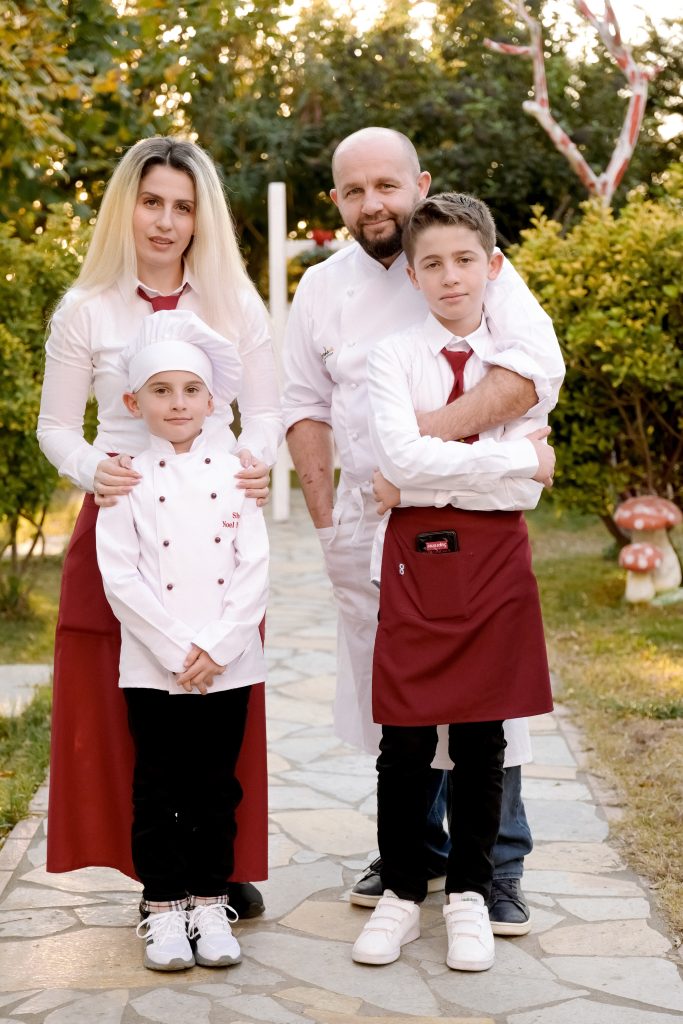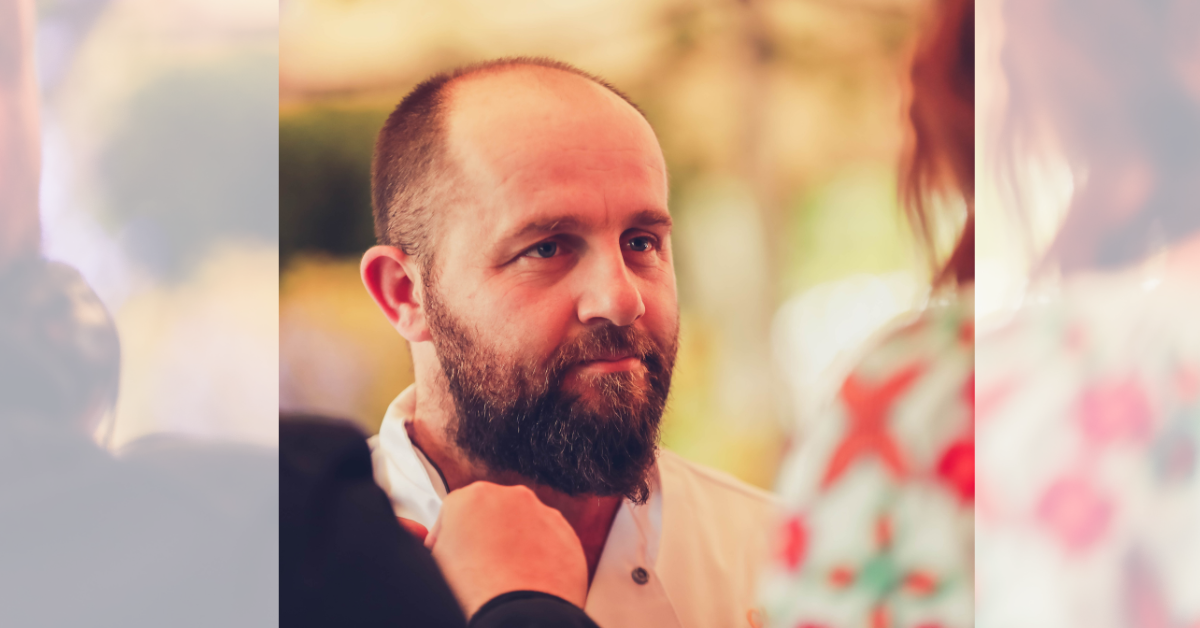Chef Alfred Marku has become a luminary in the culinary world, revolutionizing Albanian gastronomy by transforming traditional dishes into gourmet masterpieces. His journey began in Italy, where he honed his skills and developed a deep appreciation for the art of cooking. After gaining valuable experience and expertise, he returned to Albania and has been at the helm of his own restaurant for the past 17 years. Chef Marku’s innovative approach and commitment to excellence have brought a sophisticated flair to Albanian cuisine, earning him international acclaim. His restaurant, Rapsodia, near Shengjin Beach, has become a beacon of culinary excellence, attracting food enthusiasts from around the globe. By seamlessly blending traditional Albanian ingredients with modern techniques, Chef Marku has created a unique dining experience that celebrates the rich heritage of his homeland. His dedication to nurturing the next generation of culinary talent and promoting sustainable agriculture further solidifies his impact on the industry. Through his passion and creativity, Chef Alfred Marku continues to elevate Albanian cuisine to new heights, inspiring others to explore and appreciate its flavors.

Chef Marku, can you share your journey from Italy back to Albania and how your experiences in Italy influenced your culinary style?
The return was almost sudden. I went to Italy at a very young age, like all young Albanian immigrants, who crossed the sea to get to know a world that had been denied to them. I was 15 years old and I started with the most menial jobs, washing dishes and everything else I was given until I managed to work as a chef and successfully passed a Michelin inspection in the restaurant where I worked. I had discovered a new culinary world, which built my work culture and a clear vision of what I wanted and knew how to do best.
With this new luggage and with my mind towards Albania, I suddenly decided to return.
In 2006, I opened my restaurant “Rapsodia” in Shengjin. The first impact was very wild. I had returned with the thought that I was going home, but it was not the home I left and I had changed as well.
During the first 6 months, I worked without a menu at all, I cooked whatever the customers asked; I wanted to understand the tastes and preferences they had. I realized that very little, to say nothing, had changed in the food tastes of the Albanian public. I had to change the approach: the public had to be exposed to new tastes, to a new eating culture that relied on quality and not quantity. I started cooking what I liked, having in mind what a real restaurant should offer. Once I prepared an ice cream with shrimp and chocolate. As I offered it to customers to try, I asked them what they thought it was made with. I heard all kinds of thoughts, but no one identified the ingredients. I will never forget how surprised they were. I wanted to stir their thoughts on food; I didn’t mind them insulting me, but they had to engage in discussions, I wanted them to talk about my approach to recipes. When I was offering gourmet to them, it was a time when the concept wasn’t even on the table.
What inspired you to transform traditional Albanian dishes into gourmet masterpieces, and what challenges did you face in this creative process?

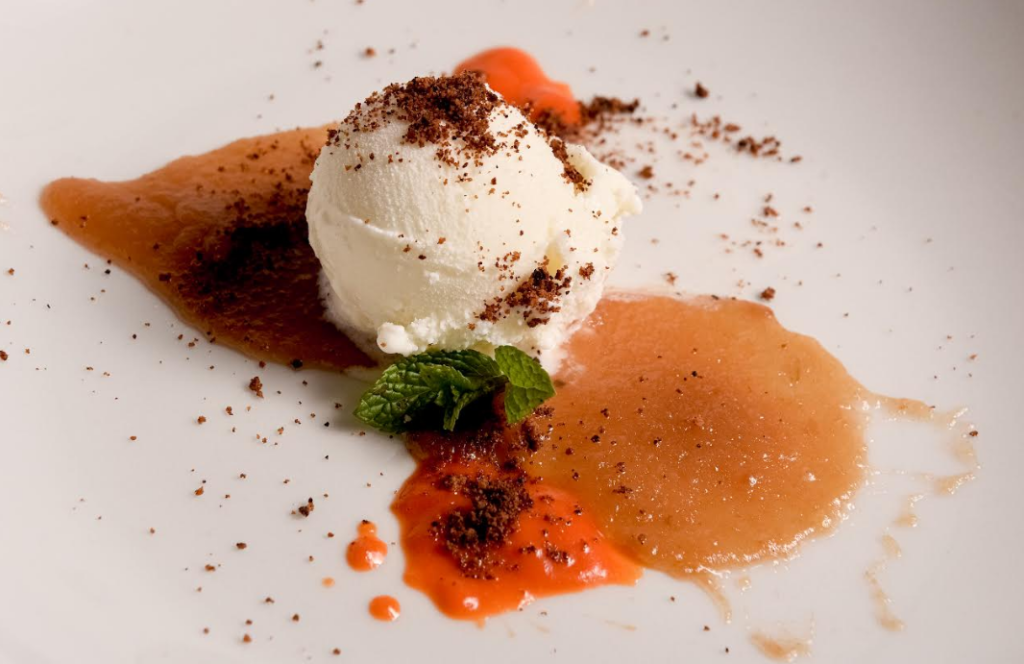

It has been a long but steady process of development. I started with Italian cuisine, the one I cooked in Italy, in high-end restaurants. Meanwhile, every day I was rediscovering the Albanian ingredients and the full, lively taste they had. That’s how I started to make them part of the recipes and introduce them to the menu.
However, it didn’t stop there. I delved into learning more about the Albanian culinary tradition; I was 15 years old, and I didn’t know any of our traditional recipes. I was left with the tastes and aromas I loved from my childhood. This memory awakened my interest to experiment more, and it turned into my challenge: to bring back in a new, modern form the dishes loved by Albanians. I had to bring them finer, more beautiful, but keeping the taste clean. In short: a traditional dish had to come like love at first sight.
We’ve brought the classics: pilaf and baked fish casserole, taskebab, cheesecake, stuffed peppers, cornbread, roast beef, ground-aged cow’s cheese, cauliflower pie, chicory flower, pumpkin pie, and more. This was my challenge, and I believe I succeeded, customers come because they know that in Rapsodi they find the traditional taste of the Albanian family, elegantly presented in a gourmet format.
Your restaurant, Rapsodia, has been a cornerstone of the local gastronomic scene for 17 years. What do you believe is the secret to its enduring success?

Yes, it has, and I’m so proud of it. Rapsodi has been an important cornerstone in the Albanian gastronomic offer. Because we were the first ones to have the courage to cook differently, to serve differently, introducing a standard that the Albanian environment wasn’t familiar with.
I think the secret was having the courage to offer what I liked, rather than what the clientele was known to like. Slowly the customers got used to it, they came for that taste, which they couldn’t find anywhere else. Colleagues also understood the approach: the clientele is educated to recognize quality, oriented to choose with confidence in professionals, and encouraged to try the new.
I have always been aware of what the “innovative” was in form, while in concept I have only reawakened tradition.
The Albanian culture of hospitality has traditionally been based on appetizers: a variety of cooking and tastes, which is the basis of the gourmet tasting menu we offer at Rapsodi: a variety of tastes that are enjoyed in small portions.
My great-grandfather used to wait for his friend with appetizers, the bread was served at the end. It was an insult to the friend if you offered the bread first; the friend was welcomed with good and varied food.
Isn’t this the modern concept of culinary offer after all, – gourmet food?
This approach changed the mindset of the public and its expectations of restaurants. Albania is today a paradise in the culinary offer: diverse, well cooked, with quality products and full taste.
Can you tell us about the significance of being chosen to create the “Independence Cake” for Albania’s 100 years of independence in 2012? How did you approach such a monumental task?
I didn’t expect you to have this information ☺
It was a big celebration for us Albanians: the celebration of the 100th anniversary of the founding of the state. The arrangements of the celebrations became a topic of discussion at that time. Feeling excited and with a sense of responsibility to bring something impressive to the celebration protocol, I built the concept of a giant cake, like a big mahogany for everyone. I talked about it with a colleague, and he agreed to be involved in cooking; We began to structure the concept in detail. Certain that we would achieve something beautiful, I suggested the idea to the Mayor of Tirana and he accepted without hesitation. So, we rolled our sleeves. I remember we worked for 20 days in a row to prepare a giant cake with an area of 680 square meters and a weight of 18 tons. Nothing was accidental, we took care of every detail: We used olives, as a symbol of peace and pomegranate, as a symbol of family and love. The pomegranate is also a symbol of Lezha, my city, which is a crown stone in the history of Albanians.
You were selected to cook for the official dinner of the UEFA Conference League in 2022. How did this experience differ from your regular culinary endeavors, and what did it mean to you personally?

The state protocol required a lunch that best presented the best of Albanian traditional dishes. Every region had to be represented with their typical dishes but cooked in a refined way to the height of the event. So, a very good range of flavors was needed, combined with Albanian wines. In short, a Rhapsody was needed.
I tried to elegantly include the best elements of Albanian tradition and flavors, such as marinated sea bass with green garlic cream and citrus vinaigrette; chicken in the nest, which was a chicken roll accompanied by noodles and porridge (these are typical Albanian dishes), served on a plate with two different dimensions, according to the two tribes that stand out in this tradition: Mirdita and Dibra.
It was a difficult undertaking, but we were best rewarded with the very good impressions of the diners.
As a consultant for start-ups in the cuisine industry, what key pieces of advice do you offer to budding restaurateurs and chefs?
I believe that in a global world, identity makes a difference. Every business in this field must know and develop the history of the environment where it serves, its history, and its origin. This gives you identity features, makes you distinct in this big world, connects you with the community close to you, and defines your profile in the market. You will remain anonymous if no authenticity is revealed. That’s why I always advise young people to know their traditions and respect them, not to get lost in the trends of the time, to learn to declare themselves with skill, work, perseverance, and faith. These always pay off.
Your involvement with the “Sapa Zadrima” cooperative and the “Kolin Gjoka” school in Lezhe showcases your dedication to sustainable agriculture and culinary education. How do you balance these roles with running a successful restaurant?


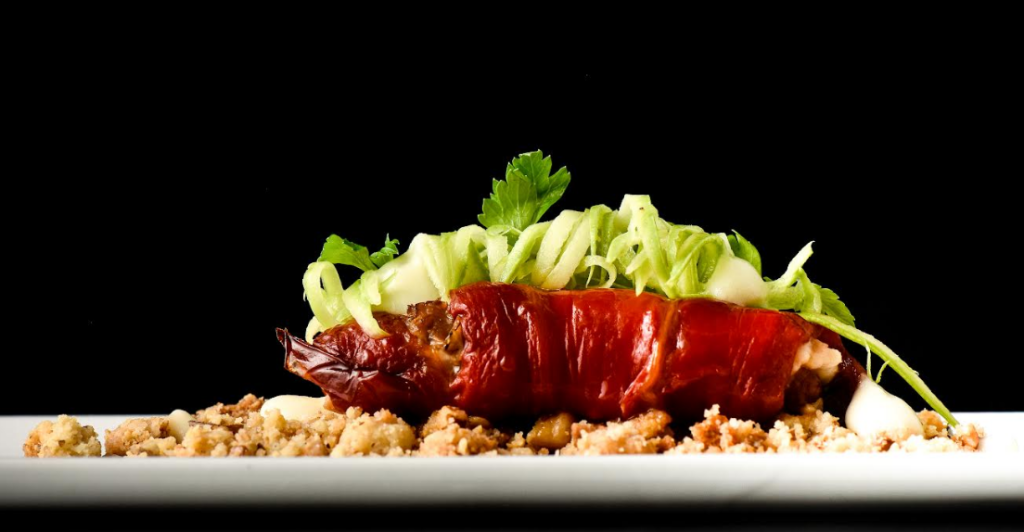
In Italy, I was the internal administrator of an agrotourism cooperative, it was called Alpe del Garda. I fell in love with agritourism. Franco Rossi managed to build a beautiful story in Lago di Garda, a magical place of beauty and prosperity. He entrusted me with agrotourism and from that experience I developed my dream of returning to Albania. I wanted to build a cooperative. They did not receive it well, starting with my father; I believe that the rejection of the idea was related to the bitter memory that people in Albania had of the cooperatives of the communist regime, which had sown poverty and scarcity in the Albanian countryside.
Patiently, I tried to explain the concept of the cooperative that I wanted to build and Sapa Zadrimë is active to this day, it has a winery, a factory for the production of olive oil, and it serves the villagers of the area.
Can you discuss the motivation behind creating your production line of dairy by-products and how it aligns with your overall vision for the food industry?
Baxho “Rhapsody” remains the biggest challenge I have encountered so far. I was clear about what I wanted to do, but no one, starting from my father, believed that it could succeed as a project. He raised chickens and that was the only investment opportunity he knew had a certain potential. I believe my mother influenced him to consider my idea. She could see how much I cared about her and she knew the persistence and passion I put into things. Back then, applied to an Italian project supporting repatriated immigrants, and I won.
I remember we bought the necessary equipment, and in 2008 I managed to open the dairy. For 30 days in a row, we managed to process only 20 liters of milk per day, no one believed that we would succeed.
Today we process 5000 liters of milk per day and we are present with our products throughout Albania. We introduced Napa cheese to the market, an early product in the Albanian tradition, which we managed to bring back with the same technique and taste.
Rapsodia emphasizes health and wellness in its menu. How do you ensure that your dishes cater to a variety of dietary preferences while maintaining the high standards of taste and presentation?
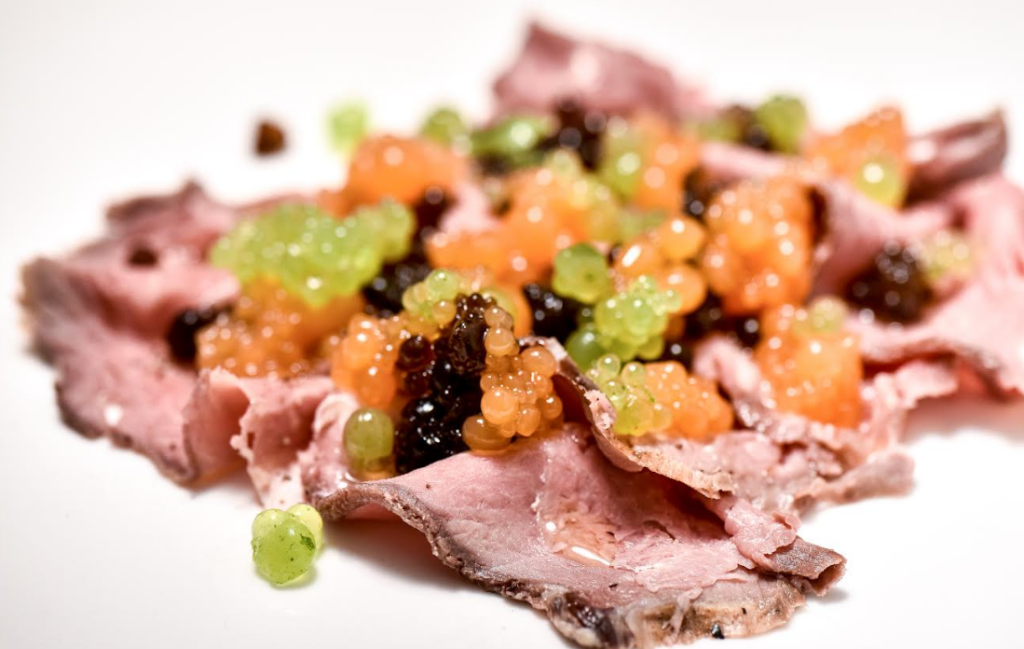

Cooking means working passionately all the time. You have to love what you do, and that’s the beginning. Then, this makes you take care of the ingredients/products you buy, where you buy them, how you treat them, how you process them, how you serve them… Especially the processing techniques are very important because they are directly related to the preservation of nutritional values. This is primary for us: to always be in search of innovations in techniques, technologies, the scientific discoveries related to good nutrition and the relationship of food with the human organism, even for the order of serving: how foods are metabolized better. There are many scientific updates in this direction, which often overturn even the clichés about what we believe we know or are correct.
All this in one lens: food is like love, it requires a lot of care and sweet fire ☺
Looking ahead, what are your aspirations for the future of Albanian cuisine, and how do you envision your role in shaping this future?
Here we are talking about dreams, which should not be left in the drawer.
My next project is called “Stork Burger” and it marks another dream come true.
The idea has taken shape in recent years, as the rhythms of life push human society towards the “fast” concept. To me, this brought excitement about a fast food line: how could I combine my concept of cooking with food fast? Could I make fast but healthy food at the same time? As a parent, this has been a real concern for me. On the other hand, in the restaurant, I have always managed to please the children and their parents who were happy to see the child being fed healthily without the usual efforts. So I was convinced that it was time to offer a new service: healthy fast food – which remains a favorite taste for children, but completely safe as a product, where everything is prepared fresh in the kitchen, from bread to sauces.
With the childhood image of the Stork character holding food in his beak to feed the little ones, we started with the “Stork Burger”. I believe we are on the right track to mark another success story.
Another dream I am working on is a restaurant certification process in Albania, building a professional guide that will set standards for what culinary has to offer in my country. Seeing the recent boost in tourism in Albania, I think the time has come to seriously invest in this direction.
I hope that in the next interview with your esteemed readers, we will be able to share the good news about this project coming to life.
Thank you for your attention and the opportunity to have this conversation.
